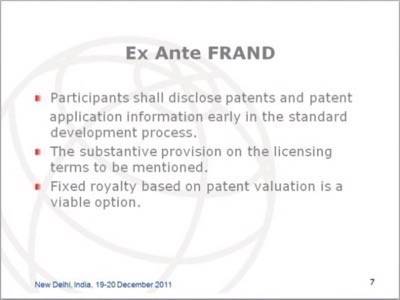Not quite two months after the European Commission approved Google’s pending acquisition of smartphone maker Motorola Mobility (MMI) on the grounds that it would be pro-competitive and would not impact the patent market much, the lawmaking body announced it is opening up two parallel investigations of MMI’s conduct. One will study whether the company failed to honor its patent licensing term commitments to Europe’s counterpart to the FCC, the ETSI. The other will look into whether Motorola made similar missteps in its dealings with the International Telecommunication Union – the United Nations agency that looks after the world’s broadband markets, and which one U.S. FCC commissioner fears may eventually be appointed caretaker of the Internet.

One of this morning’s announcements from Brussels reads, “In particular, the Commission will investigate whether Motorola Mobility Inc. has infringed the competition rules in licensing negotiations, including by seeking and enforcing injunctions in national courts in relation to some of its ETSI SEPs [essential standards].”
Is Competitive Conduct Nonaggressive Conduct?
The Commission made it clear this morning that it is not alleging that MMI has abused any dominant market position it may have, but rather that it is investigating complaints to that affect. Those complaints are coming from Apple and Microsoft, perhaps among others. The ETSI investigation will determine whether Motorola’s efforts to enforce injunctions against Apple and Microsoft, particularly with regard to its patents around H.264 video technology for mobile devices, directly impacts the ability for mobile services and device providers in member states to do business with other member states.
The EC’s history with these investigations suggests it will not be investigating whether Apple or Microsoft is harmed by Motorola’s conduct. With respect to its own priorities over who gets harmed, the Commission continues to cite a 2005 speech by then-Commissioner for Competition Neelie Kroes. At that time, Kroes told the Fordham Law Institute in the U.S., “I like aggressive competition – including by dominant companies – and I don’t care if it may hurt competitors as long as it ultimately benefits consumers. That is because the main and ultimate objective of Article 82 is to protect consumers, and this does, of course, require the protection of an undistorted competitive process on the market.” (Article 82 has since been renumbered Article 102, and the ETSI investigation is based on whether Motorola violated the terms of 102.)
Last February, Apple’s public stance against Motorola’s aggressive conduct in Europe triggered a wave of public sentiment that Microsoft couldn’t afford not to join. In what it had thought at the time would be a defense of its future division, Google admitted that MMI had sought 2.25% per-unit sales royalties for devices found to utilize technology in MMI’s portfolio.
But the following month, Apple won its own round of injunctions against MMI in a Mannheim court, including for portable devices that manage photos – part of Apple’s own extensive portfolio. The crossfire ended up getting too heavy for Microsoft, which yesterday told a German business news service it’s pulling its distribution center out of North Rhine-Westphalia and relocating it to the Netherlands. The service noted quite accurately that German courts are speedier than other European courts at imposing injunctions, including against Samsung on some of Apple’s design claims, and against Apple on a Motorola claim concerning push email service (a subject you would have thought RIM would have already locked up).
Slide from a December 2011 ITU presentation by Utsab Bannerjee on FRAND licensing. [Courtesy International Telecommunication Union]

Ex Ante or Not Ex Ante
The second EC investigation is on behalf of two international standards organizations: the IEEE and the ITU, as part of the EC’s mandate to act on behalf of member states if it believes anticompetitive conduct may be affecting those states. In this case, although it may appear the EC is acting as an enforcement body on behalf of international entities outside its purview, the question is effectively whether these agencies were used as tools when Motorola promised them to adhere to “fair, reasonable and non-discriminatory” (what FRAND stands for this week) licensing terms.
The ITU will be an interesting case, especially because of how publicly it has been reconsidering the FRAND issue and even the acronym. At an ITU meeting in New Delhi last December, Indian consultant Utsab Bannerjee introduced participants to a concept called “ex ante FRAND.” It sounds like a method for cooking a French dessert. Actually, it’s the notion that any company that offers a prospective standard to the community for its consideration should also put forth how much it intends to ask in royalties before it becomes a standard.
In an article last year for the American Bar Association’s Antitrust Law Journal (PDF available here), a quartet of ABA members cited the problem of “patent holdup.” Here, one patent portfolio holder creates a situation in which multiple parties are forced to pay whatever the IP holder declares to be reasonable, justifying its value formula by demonstrating how many licensees are dependent upon it.
The ABA attorneys make the case that ex ante FRAND is, by its very nature, overridden by the standards-setting process itself. “Because of the threat of standard-setting abuse and lock-in, many SSOs [standards-setting organizations] have adopted intellectual property rights (IPR) policies geared towards preserving the benefits of the ex ante competitive situation that standard setting supplants. IPR policies seek to strike a balance between allowing patent holders to be rewarded for their innovations while protecting the standard implementer from potential abuse of the exclusionary power achieved as a result of the standardization process. When successful, these policies not only minimize the risk of patent holdup but also accelerate implementation of valuable technology, with the potential for revenue to patent holders through licensing on competitive terms and conditions.”
In a position paper on the subject last July (PDF available here), Nokia – now Microsoft’s most valuable partner in mobile – took a stand in favor of regulators requiring ex ante be included in their interpretation of FRAND terms. “Overall, Nokia believes it would be beneficial if the regulator were to encourage SSOs to require a general ex ante FRAND declaration,” the company declared, “and subsequently patent-specific disclosures on a ‘good faith’ basis once patent holders have acquired a reasonable level of certainty that their patents are or will become essential, even in the context of royalty-free (RF) standards to avoid subsequent confusion (e.g., in the case of transfer of ownership of relevant patents)… SSOs should also ensure that patent disclosures and licensing declarations are publicly visible to everyone.”
But in an old-but-still-relevant 2006 refutation of the value of ex ante, attorney Richard S. Taffet specifically cited the ITU as one organization whose existing rules render ex ante unnecessary. Members seeking an ITU standard must inform the director’s office, Taffet noted, about any existent patent applications, either granted or pending, “from the outset” of any standards proposal process. That’s already ex ante enough, Taffet believed.
“The concept of ‘from the outset’ as used in the ITU-T context is an important one,” wrote Taffet. “It takes into account the reality that standards development is a dynamic process, and that it may be impossible for a patent owner to identify with any degree of certainty a patent or patent claim that is in face essential to the implementation of a standard until that standard has reached a point of sufficient maturity where it is clear what the defined standardized technology will be… A rule that requires mandatory ex ante disclosure of patents and binding irrevocable license terms, however, would impose upon such patent owners such onerous burdens and costs, because if the patent owners did not undertake such efforts and later discovered essential patents when the standard matured, they could be estopped from asserting their patent rights. As a result, the patent owner might re-think its willingness to participate in the [standards development organization] with such rules.”
So the question with respect to the ITU may be whether Motorola had an obligation, under the rules of ITU membership, to notify its leaders about the patents it had in its portfolio and what it intended to do with them; and, if so, did it fulfill or overlook that obligation?




















